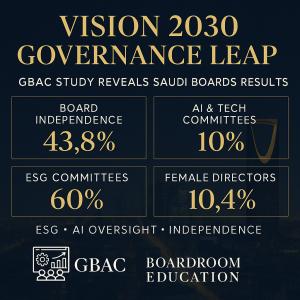Vision 2030: GBAC Board Study—Saudi MSCI Top‑10 Lead in ESG, AI, Independence
GBAC benchmark reveals Saudi boards outpace GCC peers and align with OECD, ESG, and AI standards—positioning the Kingdom for global FDI leadership.
Global Board Advisors Corp (GBAC) and BoardroomEducation.com have released a landmark governance benchmarking study of the MSCI Saudi Top 10 companies, representing 73% of the Kingdom’s market capitalization. The analysis reveals that Saudi Arabia’s boards now meet or exceed international standards in ESG, AI oversight, and board independence—signaling the Kingdom’s readiness for global capital inflows and a new era of leadership in the MENA region.
The study benchmarks Saudi board practices against peers in the US, UK, UAE, and Qatar using globally recognized frameworks from the OECD, World Economic Forum, and MSCI ESG Governance Ratings.
Key Findings – Saudi Boards Now Lead the GCC
Board Independence (43.8%): Highest in the Gulf, strengthening board oversight and investor protection.
AI & Tech Governance (10%): Saudi Arabia is the only GCC market with board-level Technology & AI Committees—led by pioneers like Dr. Deema Alathel at Saudi Awwal Bank.
ESG Oversight (60% ESG Committees; 100% Reporting): A regional best, aligning with ESG fund mandates from BlackRock, State Street, and sovereign investors.
Female Board Representation (10.4%): Achieved without quotas, nearing UAE parity and supporting global diversity benchmarks.
CEO/Chair Separation (100%): Exceeding US (60%) and UK (90%) levels—reinforcing structural independence.
Government Representation (60%): The lowest among GCC peers, indicating a shift toward professionally governed boards in state-linked enterprises.
CEO Statement
“Saudi corporate governance is no longer catching up—it’s leading,” said Prof. Yusuf Azizullah, CEO of GBAC.
“This study confirms that Saudi boards are aligning with the expectations of institutional investors, sovereign wealth funds, and capital markets—particularly in ESG oversight, AI governance, and board independence. These reforms lay a powerful foundation for Vision 2030’s economic transformation.”
He added:
“The MENA region is entering a new era of governance aligned with international best practices. Saudi Arabia is uniquely positioned to become the region’s first developed market—driven by Tadawul’s momentum and Riyadh’s bold ambition to emerge as the world’s third-largest financial center after New York and London.”
Next Steps for Boards
To help boards act on these insights, GBAC is launching tailored governance programs focused on:
Increasing board independence to global benchmarks (75%+)
Expanding female director pipelines and next-gen board talent
Institutionalizing AI and ESG oversight in board strategy
Aligning disclosures with ISSB, OECD, and sovereign fund mandates
On May 28, 2025, GBAC and BoardroomEducation.com will host an exclusive Dubai launch event, convening board chairs, sovereign fund senior leadership, and institutional investors to explore the report’s findings and boardroom priorities.
Participation is by invitation only. To request access, contact Chad Clark at chad@globalboardadvisors.com.
About GBAC
Global Board Advisors Corp (GBAC) is the only board governance and education firm globally recognized as a member of the AACSB Business Education Alliance. GBAC advises sovereign wealth funds, listed companies, and Global 100 boards on board evaluations, AI/ESG oversight, and capital markets strategy—using frameworks aligned with OECD, WEF, and MSCI ESG standards.
Ivey Engineering Awards $1,000 Scholarship to Mission University Student Gavin Hall
Augusta Precious Metals Reviews, Fees, Complaints, and Gold IRA Analysis Released
Veteran IT Leader Will Decatur Joins MET Florida Board
Więcej ważnych informacji
 Jedynka Newserii
Jedynka Newserii

 Jedynka Newserii
Jedynka Newserii

Konsument

Grupa nowych biednych emerytów stale się powiększa. Ich świadczenie jest znacznie poniżej minimalnej emerytury
Przybywa osób, które z powodu zbyt krótkiego czasu opłacania składek pobierają emeryturę niższą od minimalnej. Tak zwanych nowych biednych emerytów jest w Polsce ok. 430 tys., a zdecydowaną większość grupy stanowią kobiety – wskazują badania ekspertów Instytutu Pracy i Spraw Socjalnych. W ich przypadku krótszy okres składkowy zwykle wynika z konieczności opieki nad dziećmi lub innymi osobami w rodzinie. Wśród innych powodów, wymienianych zarówno przez panie, jak i panów, są także praca za granicą lub na czarno oraz zły stan zdrowia.
Media i PR
M. Wawrykiewicz (PO): Postępowanie z art. 7 przeciw Węgrom pokazało iluzoryczność tej sankcji. Unia wywiera naciski poprzez negocjacje nowego budżetu

Przykład Węgier pokazał, że procedura z artykułu 7 traktatu o UE o łamanie praworządności nie ma mocy prawnej z powodu braku większości, nie mówiąc o jednomyślności wśród pozostałych państw członkowskich. Negocjacje nowego budżetu UE to dobry pretekst do zmiany sposobu części finansowania z pominięciem rządu centralnego. Czerwcowy marsz Pride w Budapeszcie pokazał, że część społeczeństwa, głównie stolica, jest przeciwna rządom Viktora Orbána, ale i na prowincji świadomość konsekwencji działań Fideszu staje się coraz większa przed przyszłorocznymi wyborami.
Firma
Blockchain zmienia rynek pracy i edukacji. Poszukiwane są osoby posiadające wiedzę z różnych dziedzin

Zapotrzebowanie na specjalistów od technologii blockchain dynamicznie rośnie – nie tylko w obszarze IT, ale również w administracji, finansach czy logistyce. Coraz więcej uczelni wprowadza programy związane z rozproszonymi rejestrami, które wyposażają studentów w umiejętności odpowiadające wymogom rynku.
Partner serwisu
Szkolenia

Akademia Newserii
Akademia Newserii to projekt, w ramach którego najlepsi polscy dziennikarze biznesowi, giełdowi oraz lifestylowi, a także szkoleniowcy z wieloletnim doświadczeniem dzielą się swoją wiedzą nt. pracy z mediami.


![Nestlé w Polsce podsumowuje wpływ na krajową gospodarkę. Firma wygenerowała 0,6 proc. polskiego PKB [DEPESZA]](https://www.newseria.pl/files/1097841585/fabryka-nesquik_1,w_85,r_png,_small.png)






.gif)

 |
| |
| |
|